Unit 1 Stay Healthy Lesson4 Don't Smoke,Please!课件(共32张PPT)
文档属性
| 名称 | Unit 1 Stay Healthy Lesson4 Don't Smoke,Please!课件(共32张PPT) |

|
|
| 格式 | zip | ||
| 文件大小 | 1.1MB | ||
| 资源类型 | 教案 | ||
| 版本资源 | 冀教版 | ||
| 科目 | 英语 | ||
| 更新时间 | 2022-05-08 17:53:41 | ||
图片预览

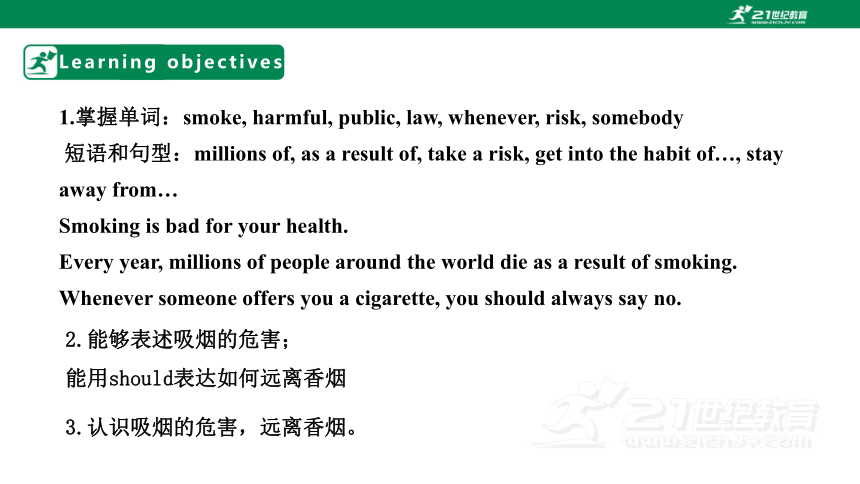
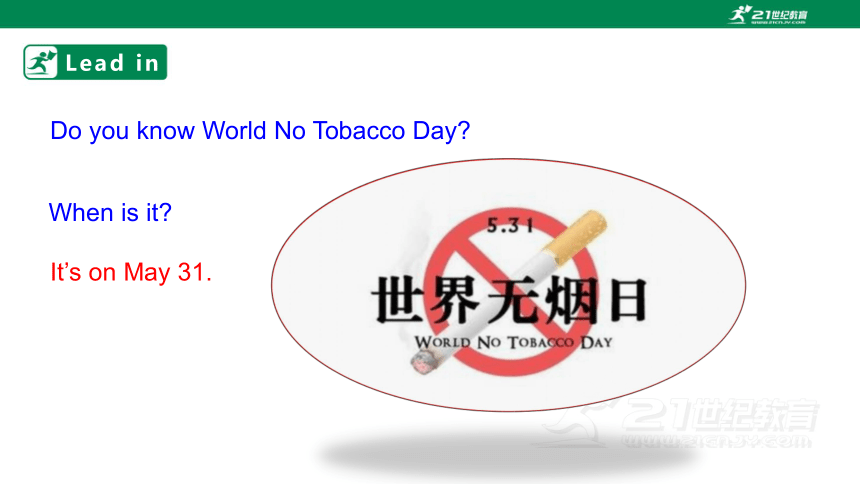
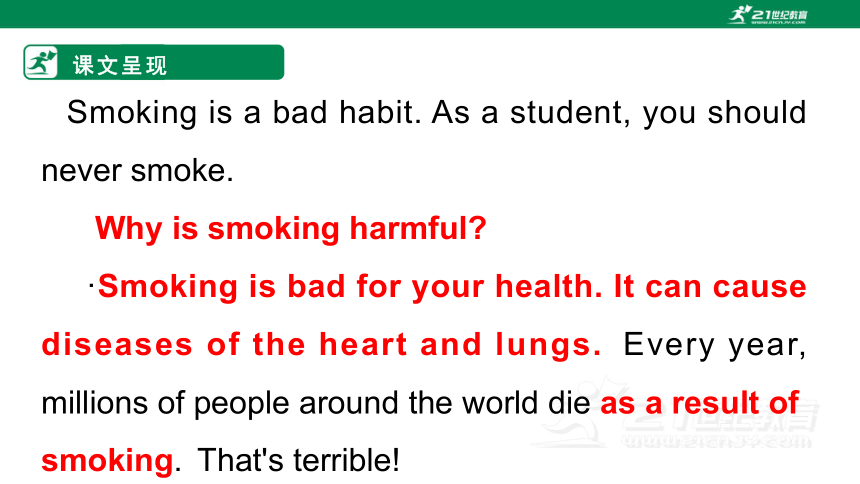


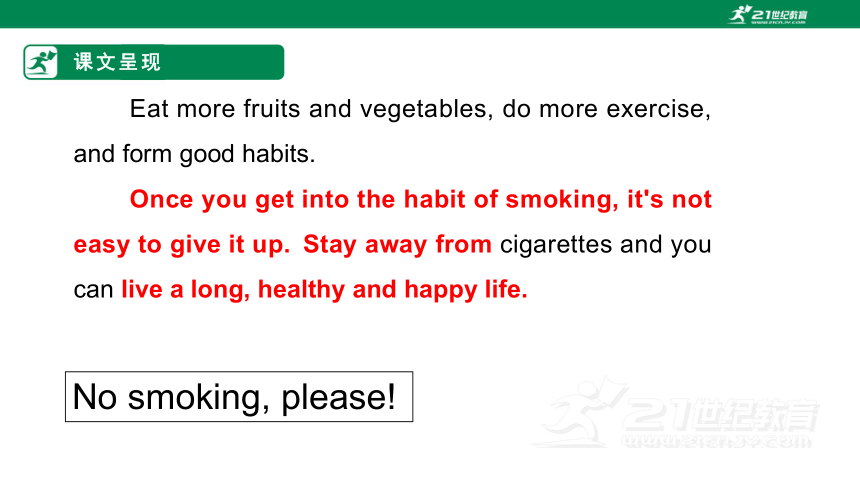

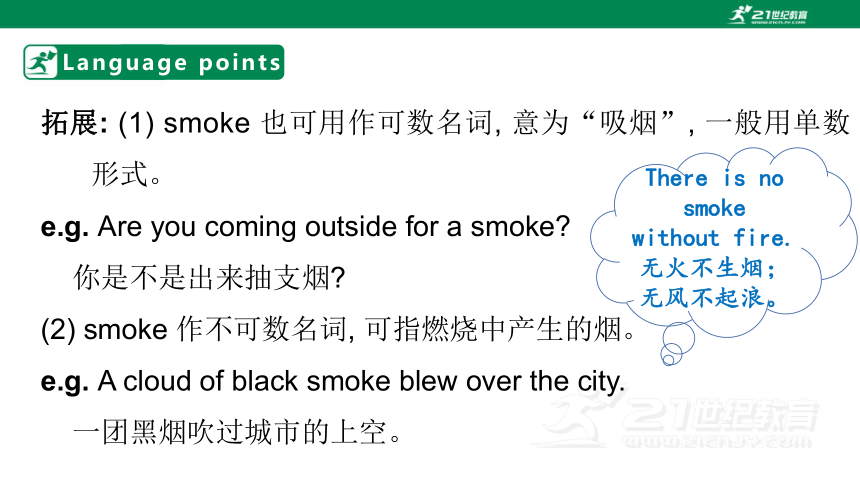
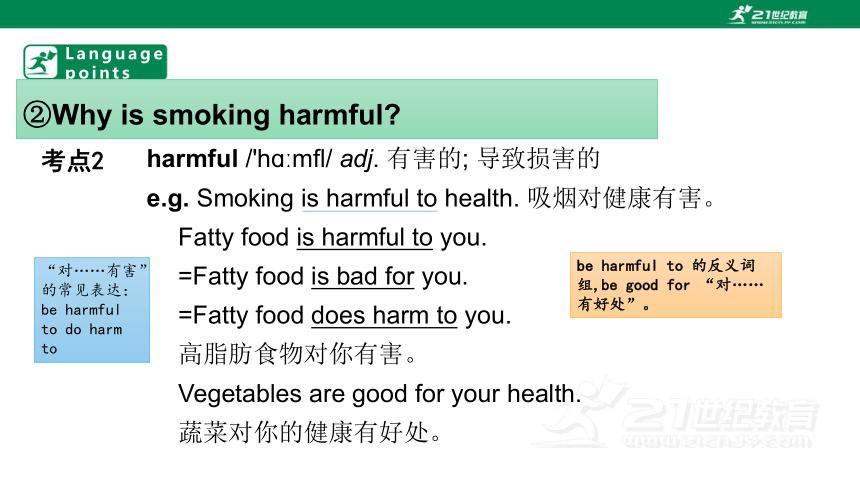
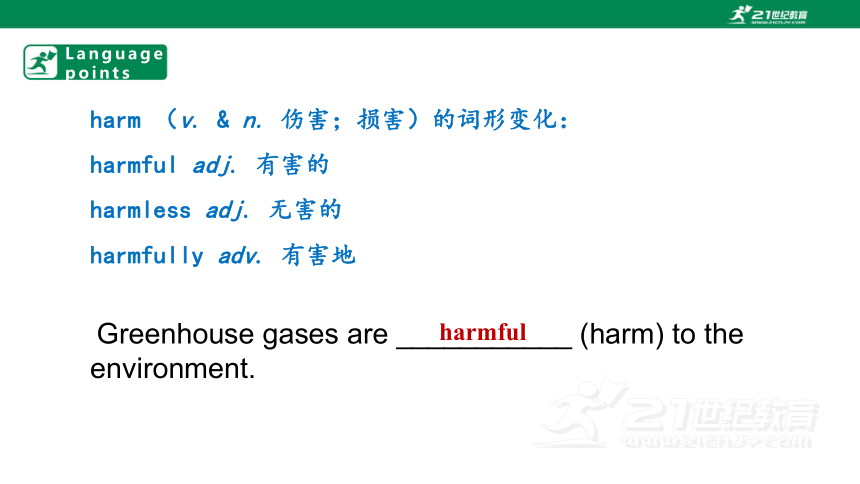
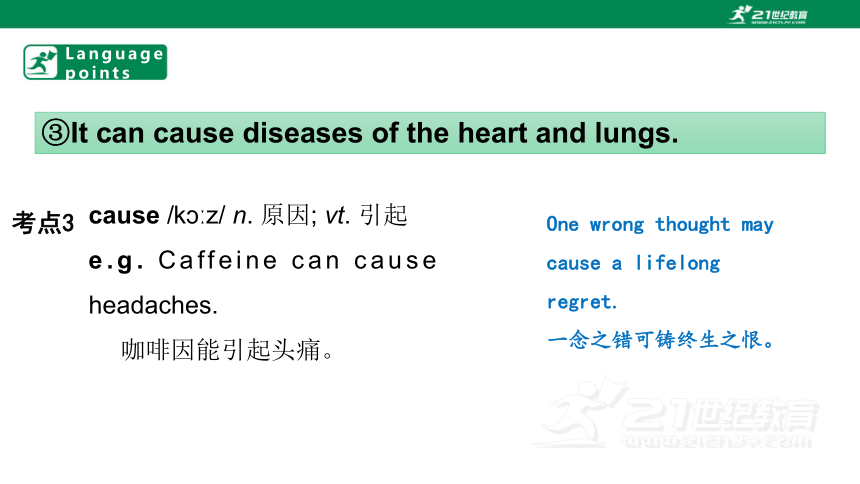
文档简介
(共32张PPT)
Lesson 4
Don’t Smoke, Please !
冀教版九年级上册
Learning objectives
1.掌握单词:smoke, harmful, public, law, whenever, risk, somebody
短语和句型:millions of, as a result of, take a risk, get into the habit of…, stay away from…
Smoking is bad for your health.
Every year, millions of people around the world die as a result of smoking.
Whenever someone offers you a cigarette, you should always say no.
2.能够表述吸烟的危害;
能用should表达如何远离香烟
3.认识吸烟的危害,远离香烟。
Lead in
Do you know World No Tobacco Day
When is it
It’s on May 31.
课文呈现
Smoking is a bad habit. As a student, you should never smoke.
Why is smoking harmful
·Smoking is bad for your health. It can cause diseases of the heart and lungs. Every year, millions of people around the world die as a result of smoking. That's terrible!
课文呈现
·If you smoke, you harm yourself, but you're also harming the people around you with your second hand smoke.
·Smoking pollutes the environment, too. Everyone wants to live in a clean environment and breathe fresh air. In many countries, smoking in public places is now against the law.
课文呈现
What should we do
·Never touch cigarettes. Whenever someone offers you a cigarette, you should always say no. Don't take that risk.
·When somebody talks about smoking, change the topic.
·If your family members smoke, encourage them to stop smoking. It will be hard for them, but you should try explaining how important it is for their health.
课文呈现
Eat more fruits and vegetables, do more exercise, and form good habits.
Once you get into the habit of smoking, it's not easy to give it up. Stay away from cigarettes and you can live a long, healthy and happy life.
No smoking, please!
Language points
①Do people in your family smoke
考点1
smoke /sm k/ v. 吸烟 n. 烟
e.g. It’s against the rules of the school to smoke.
吸烟是违反校规的。
How many cigarettes do you smoke a day
你一天抽多少香烟
作不及物动词
作及物动词
Language points
拓展: (1) smoke 也可用作可数名词, 意为“吸烟”, 一般用单数形式。
e.g. Are you coming outside for a smoke
你是不是出来抽支烟
(2) smoke 作不可数名词, 可指燃烧中产生的烟。
e.g. A cloud of black smoke blew over the city.
一团黑烟吹过城市的上空。
There is no smoke without fire.
无火不生烟;无风不起浪。
Language points
②Why is smoking harmful
harmful /'hɑ mfl/ adj. 有害的; 导致损害的
e.g. Smoking is harmful to health. 吸烟对健康有害。
Fatty food is harmful to you.
=Fatty food is bad for you.
=Fatty food does harm to you.
高脂肪食物对你有害。
Vegetables are good for your health.
蔬菜对你的健康有好处。
“对……有害”的常见表达:
be harmful to do harm to
be harmful to 的反义词组,be good for “对……有好处”。
考点2
Language points
harm (v. & n. 伤害;损害)的词形变化:
harmful adj. 有害的
harmless adj. 无害的
harmfully adv. 有害地
Greenhouse gases are ___________ (harm) to the environment.
harmful
Language points
③It can cause diseases of the heart and lungs.
cause /k z/ n. 原因; vt. 引起
e.g. Caffeine can cause headaches.
咖啡因能引起头痛。
One wrong thought may cause a lifelong regret.
一念之错可铸终生之恨。
考点3
Language points
拓展: cause 的其他含义:
cause 动词, “使发生, 导致”。
e.g. An accident caused him to lose his job.
一次事故导致他失去了工作。
可数名词, “原因, 起因”。
e.g. Drunk driving is one of the most common causes of traffic accidents.
酒后驾车是交通事故最常见的原因之一。
不可数名词, “理由, 动机”。
e.g. I have no cause for fear. 我没理由害怕。
Language points
disease /d 'zi z/ n. 病; 疾病
e.g. The disease spreads all over the world.
这种疾病在全世界范围内传播。
考点4
辨析: disease, illness, sickness
disease 指具体的疾病, 且通常较严重, 发病时间也较长。
illness 泛指一切疾病, 强调生病的时间或状态, 语体较sickness 正式一些。
sickness 较口语化, 可与illness换用, 但还可表示“恶心”。
Language points
The _______ boy has been in hospital for about two months. The doctor says he has serious heart _______.
A. sick; disease B. ill; illness
C. sick; illness D. ill; disease
A
Language point
④Every year, millions of people around the world die as a result of smoking.
millions of 数以百万计的
millions of 表示模糊概念, 后接可数名词复数, 且不与基数词连用。
e.g. The Great Wall attracts millions of tourists from all over the world every year. 长城每年吸引数百万来自世界各地的游客。
Language point
拓展: 当million 前有不定冠词a 或基数词修饰时, million 要用单数形式, 且million 后不接of。
e.g. The book was sold more than one million copies.
这本书被售出了一百多万册。
速记小法:
hundred,thousand,million 的用法:
s,of 不分家,
遇到数字全拿下。
模糊数字两有(有s,有of),
具体数字两无(无s,无of)。
—_______ of people come to visit the gardens in Suzhou every year.
—That’s true. The number of people to Suzhou this year is 10 _______.
A. Millions; millions B. 5 million; millions
C. Millions; million D. 5 millions; million
C
Language point
as a result of 作为……的结果
e.g. He passed the exam as a result of his good preparation.
他因为准备充分通过了考试。
As a result, he was elected the chairman.
结果, 他被选为主席。
辨析: as a result of, as a result
as a result of “由于, 作为……的结果”, 后跟名词、代词、动名词。相当于because of。
as a result 作插入语, 意为“结果”, 常单独使用, 用逗号与其他部分隔开。
Language point
⑤In many countries, smoking in public places is now against the law
against / 'ɡenst/ prep. 反对; 倚; 靠
e.g. We are against the plan. 我们反对这个计划。
后面跟名词、代词、动名词作宾语。
Ben was helping his mother when the rain began to beat heavily ______ the windows. [呼和浩特]
A. against B. across C. above D. below
A
Language point
⑥Whenever someone offers you a cigarette, you should always say no.
whenever /wen'ev / conj. 无论何时; 在任何……的时候
e.g. Please call me first whenever you leave.
=Please call me first no matter when you leave.
无论你什么时候离开, 请先给我打个电话。
引导时间状语从句,引导让步状语从句时与no matter when同义。
Language point
类似的词还有:
no matter who=whoever 无论谁
no matter what=whatever 无论什么
no matter how=however 无论怎样
no matter where=wherever 不管哪里
Miss Zhao is very helpful. She often helps us _______ we are in trouble. [大连]
A. whatever B. although
C. whenever D. however
C
Language point
⑦Don’t take that risk.
risk /r sk/ n. 危险; 风险
e.g. He saved my life at the risk of losing his own life.
他冒着生命危险救了我的命。
We don’t want to run the risk of losing their business.
我们不想冒失去他们生意的风险。
Language point
risk 作名词,常用的短语有:
① at risk 处境危险
② take/run a risk 冒险
③ at the risk of doing sth.冒着做某事的危险
④ at any risk无论冒什么危险
⑤ take/run the risk of doing sth. 冒险做某事
He decides to give up _______.
A. take risks B. taking a risk
C. to take risks D. take a risk
B
give up doing sth.
放弃做某事
Language point
⑧When somebody talks about smoking, change the topic.
somebody /'s mb d / pron. 有人; 某人
e.g. There’s somebody at the door. 门口有个人。
Somebody is waiting for you. 有人在等你。
Did you see anyone interesting
你见过有趣的人吗
形容词修饰anyone,somebody,something等复合不定代词时,形容词需要后置。
somebody是复合不定代词,相当于someone。复合不定代词作主语时,谓语动词要用单数形式。
Language point
拓展: 一般情况下, some 与one, body, thing 构成的复合不定代词用于肯定句中; any 与one, body, thing 构成的复合不定代词用于否定句或疑问句中。
e.g. —Do you have anything to tell me
你有什么事要对我说吗
—Yes, I have something to tell you.
是的, 我有些事要告诉你。
温馨提示:
在表示建议、请求或希
望对方作出肯定回答的
疑问句中,仍然用含有
some的复合不定代词。
Language point
⑩Once you get into the habit of smoking, it’s not easy to give it up.
get into the habit of 养成……的习惯
e.g. I get/fall into the habit of listening to English news every morning.
我养成了每天早晨听英语新闻的习惯。
Many retired people are in the habit of doing exercise every night.
许多退休的人习惯每天晚上做运动。
Practice
Ⅰ.单项选择。
Charlie, don’t read in the sun! It __________ your eyes!
A. is good for B. is harmful to
C. is bad to D. is sad for
2. _______ you have problems, just let me know. I’ll always be there
for you.
A. However B. Whatever C. Whenever D.Whoever
3. — Who is at the door
—A deliveryman(快递员)or _______ wanting to sell his new products.
A. everybody B. anybody C. somebody D. nobody
B
C
C
Practice
Ⅱ.根据提示完成句子。
________ _________(数以百万计的)birds fly to the south in winter..
Let the children ______ ______ ____ _______ ______(养成……的习惯) reading.
We should _______ ______ ______(远离) second-hand smoke.
He was late ______ ____ ________ _____(由于)heavy traffic.
5. A good driver never _________ ____ _______(冒险).
Millions of
get into the habit of
stay away from
as a result of
takes a risk
Summary
本节课主要学习了:
重点单词: refuse, risk,public,harm
重点短语: take care of, be afraid of, have no choice but to do sth. be used to do sth.
重点句式: It’s + adj. + to do.
并让学生更进一步的了解病人对症状及感受的描述、医护人员对病人施治过程的表达用语。
Homework
1.熟记本课时的词汇
2.熟读教材的内容
3.完成本课时的课后作业
谢谢
21世纪教育网(www.21cnjy.com)
中小学教育资源网站
兼职招聘:
https://www.21cnjy.com/recruitment/home/admin
Lesson 4
Don’t Smoke, Please !
冀教版九年级上册
Learning objectives
1.掌握单词:smoke, harmful, public, law, whenever, risk, somebody
短语和句型:millions of, as a result of, take a risk, get into the habit of…, stay away from…
Smoking is bad for your health.
Every year, millions of people around the world die as a result of smoking.
Whenever someone offers you a cigarette, you should always say no.
2.能够表述吸烟的危害;
能用should表达如何远离香烟
3.认识吸烟的危害,远离香烟。
Lead in
Do you know World No Tobacco Day
When is it
It’s on May 31.
课文呈现
Smoking is a bad habit. As a student, you should never smoke.
Why is smoking harmful
·Smoking is bad for your health. It can cause diseases of the heart and lungs. Every year, millions of people around the world die as a result of smoking. That's terrible!
课文呈现
·If you smoke, you harm yourself, but you're also harming the people around you with your second hand smoke.
·Smoking pollutes the environment, too. Everyone wants to live in a clean environment and breathe fresh air. In many countries, smoking in public places is now against the law.
课文呈现
What should we do
·Never touch cigarettes. Whenever someone offers you a cigarette, you should always say no. Don't take that risk.
·When somebody talks about smoking, change the topic.
·If your family members smoke, encourage them to stop smoking. It will be hard for them, but you should try explaining how important it is for their health.
课文呈现
Eat more fruits and vegetables, do more exercise, and form good habits.
Once you get into the habit of smoking, it's not easy to give it up. Stay away from cigarettes and you can live a long, healthy and happy life.
No smoking, please!
Language points
①Do people in your family smoke
考点1
smoke /sm k/ v. 吸烟 n. 烟
e.g. It’s against the rules of the school to smoke.
吸烟是违反校规的。
How many cigarettes do you smoke a day
你一天抽多少香烟
作不及物动词
作及物动词
Language points
拓展: (1) smoke 也可用作可数名词, 意为“吸烟”, 一般用单数形式。
e.g. Are you coming outside for a smoke
你是不是出来抽支烟
(2) smoke 作不可数名词, 可指燃烧中产生的烟。
e.g. A cloud of black smoke blew over the city.
一团黑烟吹过城市的上空。
There is no smoke without fire.
无火不生烟;无风不起浪。
Language points
②Why is smoking harmful
harmful /'hɑ mfl/ adj. 有害的; 导致损害的
e.g. Smoking is harmful to health. 吸烟对健康有害。
Fatty food is harmful to you.
=Fatty food is bad for you.
=Fatty food does harm to you.
高脂肪食物对你有害。
Vegetables are good for your health.
蔬菜对你的健康有好处。
“对……有害”的常见表达:
be harmful to do harm to
be harmful to 的反义词组,be good for “对……有好处”。
考点2
Language points
harm (v. & n. 伤害;损害)的词形变化:
harmful adj. 有害的
harmless adj. 无害的
harmfully adv. 有害地
Greenhouse gases are ___________ (harm) to the environment.
harmful
Language points
③It can cause diseases of the heart and lungs.
cause /k z/ n. 原因; vt. 引起
e.g. Caffeine can cause headaches.
咖啡因能引起头痛。
One wrong thought may cause a lifelong regret.
一念之错可铸终生之恨。
考点3
Language points
拓展: cause 的其他含义:
cause 动词, “使发生, 导致”。
e.g. An accident caused him to lose his job.
一次事故导致他失去了工作。
可数名词, “原因, 起因”。
e.g. Drunk driving is one of the most common causes of traffic accidents.
酒后驾车是交通事故最常见的原因之一。
不可数名词, “理由, 动机”。
e.g. I have no cause for fear. 我没理由害怕。
Language points
disease /d 'zi z/ n. 病; 疾病
e.g. The disease spreads all over the world.
这种疾病在全世界范围内传播。
考点4
辨析: disease, illness, sickness
disease 指具体的疾病, 且通常较严重, 发病时间也较长。
illness 泛指一切疾病, 强调生病的时间或状态, 语体较sickness 正式一些。
sickness 较口语化, 可与illness换用, 但还可表示“恶心”。
Language points
The _______ boy has been in hospital for about two months. The doctor says he has serious heart _______.
A. sick; disease B. ill; illness
C. sick; illness D. ill; disease
A
Language point
④Every year, millions of people around the world die as a result of smoking.
millions of 数以百万计的
millions of 表示模糊概念, 后接可数名词复数, 且不与基数词连用。
e.g. The Great Wall attracts millions of tourists from all over the world every year. 长城每年吸引数百万来自世界各地的游客。
Language point
拓展: 当million 前有不定冠词a 或基数词修饰时, million 要用单数形式, 且million 后不接of。
e.g. The book was sold more than one million copies.
这本书被售出了一百多万册。
速记小法:
hundred,thousand,million 的用法:
s,of 不分家,
遇到数字全拿下。
模糊数字两有(有s,有of),
具体数字两无(无s,无of)。
—_______ of people come to visit the gardens in Suzhou every year.
—That’s true. The number of people to Suzhou this year is 10 _______.
A. Millions; millions B. 5 million; millions
C. Millions; million D. 5 millions; million
C
Language point
as a result of 作为……的结果
e.g. He passed the exam as a result of his good preparation.
他因为准备充分通过了考试。
As a result, he was elected the chairman.
结果, 他被选为主席。
辨析: as a result of, as a result
as a result of “由于, 作为……的结果”, 后跟名词、代词、动名词。相当于because of。
as a result 作插入语, 意为“结果”, 常单独使用, 用逗号与其他部分隔开。
Language point
⑤In many countries, smoking in public places is now against the law
against / 'ɡenst/ prep. 反对; 倚; 靠
e.g. We are against the plan. 我们反对这个计划。
后面跟名词、代词、动名词作宾语。
Ben was helping his mother when the rain began to beat heavily ______ the windows. [呼和浩特]
A. against B. across C. above D. below
A
Language point
⑥Whenever someone offers you a cigarette, you should always say no.
whenever /wen'ev / conj. 无论何时; 在任何……的时候
e.g. Please call me first whenever you leave.
=Please call me first no matter when you leave.
无论你什么时候离开, 请先给我打个电话。
引导时间状语从句,引导让步状语从句时与no matter when同义。
Language point
类似的词还有:
no matter who=whoever 无论谁
no matter what=whatever 无论什么
no matter how=however 无论怎样
no matter where=wherever 不管哪里
Miss Zhao is very helpful. She often helps us _______ we are in trouble. [大连]
A. whatever B. although
C. whenever D. however
C
Language point
⑦Don’t take that risk.
risk /r sk/ n. 危险; 风险
e.g. He saved my life at the risk of losing his own life.
他冒着生命危险救了我的命。
We don’t want to run the risk of losing their business.
我们不想冒失去他们生意的风险。
Language point
risk 作名词,常用的短语有:
① at risk 处境危险
② take/run a risk 冒险
③ at the risk of doing sth.冒着做某事的危险
④ at any risk无论冒什么危险
⑤ take/run the risk of doing sth. 冒险做某事
He decides to give up _______.
A. take risks B. taking a risk
C. to take risks D. take a risk
B
give up doing sth.
放弃做某事
Language point
⑧When somebody talks about smoking, change the topic.
somebody /'s mb d / pron. 有人; 某人
e.g. There’s somebody at the door. 门口有个人。
Somebody is waiting for you. 有人在等你。
Did you see anyone interesting
你见过有趣的人吗
形容词修饰anyone,somebody,something等复合不定代词时,形容词需要后置。
somebody是复合不定代词,相当于someone。复合不定代词作主语时,谓语动词要用单数形式。
Language point
拓展: 一般情况下, some 与one, body, thing 构成的复合不定代词用于肯定句中; any 与one, body, thing 构成的复合不定代词用于否定句或疑问句中。
e.g. —Do you have anything to tell me
你有什么事要对我说吗
—Yes, I have something to tell you.
是的, 我有些事要告诉你。
温馨提示:
在表示建议、请求或希
望对方作出肯定回答的
疑问句中,仍然用含有
some的复合不定代词。
Language point
⑩Once you get into the habit of smoking, it’s not easy to give it up.
get into the habit of 养成……的习惯
e.g. I get/fall into the habit of listening to English news every morning.
我养成了每天早晨听英语新闻的习惯。
Many retired people are in the habit of doing exercise every night.
许多退休的人习惯每天晚上做运动。
Practice
Ⅰ.单项选择。
Charlie, don’t read in the sun! It __________ your eyes!
A. is good for B. is harmful to
C. is bad to D. is sad for
2. _______ you have problems, just let me know. I’ll always be there
for you.
A. However B. Whatever C. Whenever D.Whoever
3. — Who is at the door
—A deliveryman(快递员)or _______ wanting to sell his new products.
A. everybody B. anybody C. somebody D. nobody
B
C
C
Practice
Ⅱ.根据提示完成句子。
________ _________(数以百万计的)birds fly to the south in winter..
Let the children ______ ______ ____ _______ ______(养成……的习惯) reading.
We should _______ ______ ______(远离) second-hand smoke.
He was late ______ ____ ________ _____(由于)heavy traffic.
5. A good driver never _________ ____ _______(冒险).
Millions of
get into the habit of
stay away from
as a result of
takes a risk
Summary
本节课主要学习了:
重点单词: refuse, risk,public,harm
重点短语: take care of, be afraid of, have no choice but to do sth. be used to do sth.
重点句式: It’s + adj. + to do.
并让学生更进一步的了解病人对症状及感受的描述、医护人员对病人施治过程的表达用语。
Homework
1.熟记本课时的词汇
2.熟读教材的内容
3.完成本课时的课后作业
谢谢
21世纪教育网(www.21cnjy.com)
中小学教育资源网站
兼职招聘:
https://www.21cnjy.com/recruitment/home/admin
同课章节目录
- Unit 1 Stay Healthy
- Lesson 1 What's Wrong,Danny?
- Lesson 2 A Visit to the Dentist
- Lesson 3 Good Food, Good Health
- Lesson 4 Don't Smoke, Please!
- Lesson 5 Jane's Lucky Life
- Lesson 6 Stay Away from the Hospital
- Unit Review
- Unit 2 Great People
- Lesson 7 What Is the Meaning of Lift?
- Lesson 8 A Universe of Thought
- Lesson 9 China's Most Famous "Farmer"
- Lesson 10 Touch the World
- Lesson 11 To China, with Love
- Lesson 12 Guess My Hero!
- Unit Review
- Unit 3 Safety
- Lesson 13 Be Careful,Danny!
- Lesson 14 Accidents Happen
- Lesson 15 My Helmet Saved My Life!
- Lesson 16 How Safe Is Your Home?
- Lesson 17 Staying Safe in an Earthquake
- Lesson 18 Never Catch a Dinosaur
- Unit Review
- Unit 4 Stories and poems
- Lesson 19 A Story or a Poem?
- Lesson 20 Say It in Five
- Lesson 21 The Fable of the Woodcutte
- Lesson 22 The Giant(Ⅰ)
- Lesson 23 The Giant(Ⅱ)
- Lesson 24 Writing a Poem
- Unit Review
- Unit 5 Look into Science
- Lesson 25 Let's Do an Experiment!
- Lesson 26 Keep the Candle Burning
- Lesson 27 Planet Danny
- Lesson 28 The Study of Living Things
- Lesson 29 DNA—The Story of You
- Lesson 30 Science Affects Us
- Unit Review
- Unit 6 Movies and Theate
- Lesson 31 A movie or a Play
- Lesson 32 Moving Pictures
- Lesson 33 The Fisherman and the Goldfish(Ⅰ)
- Lesson 34 The Fisherman and the Goldfish(Ⅱ)
- Lesson 35 Theatres Are Fun!
- Lesson 36 Making Plays Is Fun
- Unit Review
